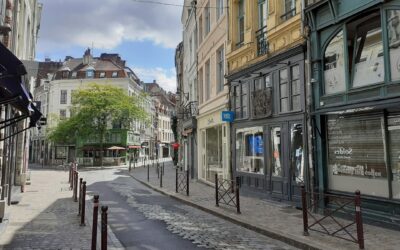Changes to subsidies for improved building insulation and replacement of gas boilers causes industry concern • An incineration site used for electricity production in Bretagne closes for renovation, and is estimated to more than double its capacity upon reopening in 2024 • A hospital center in the Ile de France region will be connected to the local heating network to be supplied by heat from wood combustion • Read more about sustainable heating and cooling developments in France in the January news update
The Ministry of Ecological Transition (MTE) is submitting an early draft for the 5th CEE period (effective on January 1, 2022) to accelerate energy transition and prepare concerned stakeholders for changes-to-come. It will be reinforced for the upcoming period (until the end of 2025) where the total volume of the obligations will be increased with 12.5% to 2400 TWhc over four years, compared to 2133 TWhc over four years for the current period.
Subsidies for 1) replacing fossil-fueled heating with renewable energies; and 2) the efficient renovation of housing are extended until 2025. However, subsidy “boosts” for certain operations (insulation actions and gas boiler replacements) will now be limited to 25% of the total volume of the obligation to strengthen the general efficiency of the CEE system. These bonuses will rather be reallocated towards other actions, and this has been criticized by concerned sectors.
The French “White certificate” Scheme is based on an obligation for energy providers to fulfill objectives of energy saving. The CEE constitutes one of the government’s main policy instruments of the energy demand control. Failed objectives result in penalty fees where the proceeds will be used to finance initiatives that represent approx. 45% of the total energy savings objectives set by the national low-carbon strategy (SNBC) and the multi-year energy program (PPE). The development of heating and cooling networks is eligible for this financial aid.
Read more in article by Batiweb
The re-opening of the “Villejean energy recovery plant (UVE)” is scheduled for 2024 where they estimate a 120% increase in the electricity production, with a 40% increase generated by heating. The incineration of waste will be included as an alternative source of energy. The current heating network serves 20,000 inhabitants and this renovation is estimated to increase this up to 35,000 inhabitants.
During the works, the waste will be transferred to two centers, one private and one public one located in Bourghbarré in the South of Rennes. The latter will also be affected by an innovative approach as it will reuse and treat plaster waste. The recycled plaster will be reinjected directly into the plasterer’s production lines or serve as a substitute for concrete, and The University of Rennes 1 is conducting research on this subject.
Read more in article by Ouest France
The heating and hot water at the intercommunal hospital center of Meulan-Les Mureaux (CHIMM), a center for psychiatry, rehabilitation, and training of caregivers, will now come from the combustion of wood. It has now been attached to Les Mureaux’s district heating network where 72% of the boiler’s heat supply is generated by renewable energies and biomass, such as the heat from wood fire.
The extension of the district network required 9 sub stations along the hospital center. It will further be extended to supply a total of 4,043 housing units. The cost of this work is estimated at 500,472 euros which, according to the Region, is partially subsidized by ADEME and the Regional Council.
Read more in article by DHC News
Read more in article by La Gazette en Yveline
To stay updated on news for sustainable heating and cooling, follow us on Twitter and LinkedIn, and subscribe to our Newsletter.
Sweden is at the forefront of decentralised heat networks technology. Our aim for “Sustainable Heating & Cooling by Sweden” is to facilitate knowledge sharing between British, French and Swedish stakeholders and develop and encourage environmental and economic best practice.
To find out how we can help you and your organisation, please contact our London or Paris-based “SHC” teams. We can introduce you to leading consultants, suppliers of technology and services who will be pleased to share know-how of the development of sustainable heating & cooling solutions.


